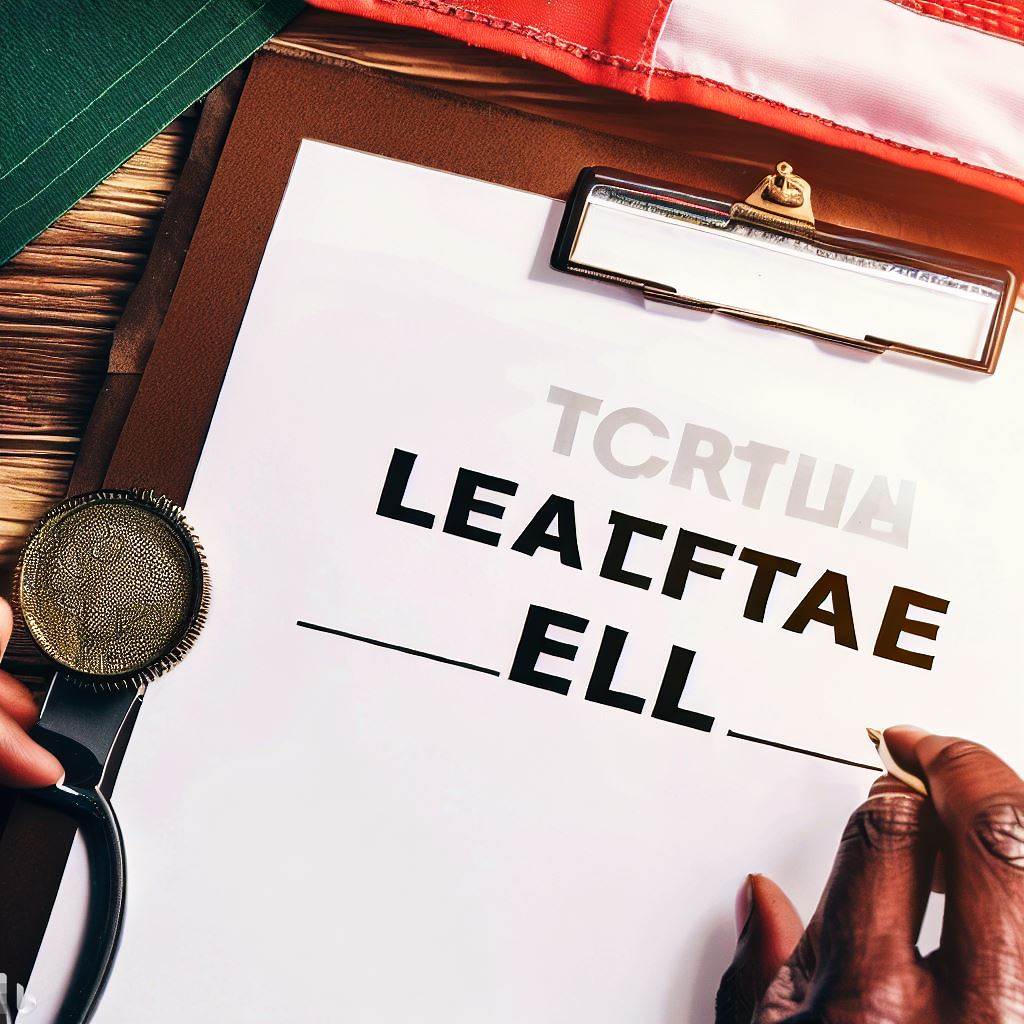How to do a land title search in Ghana
|
Getting your Trinity Audio player ready...
|
Why Conducting a Land Title Search is Important
If you’re planning to buy, sell or develop land in Ghana, it’s crucial to conduct a land title search to avoid disputes, legal issues, and fraud.
A land title search is a process of investigating the legal ownership of a piece of land and the existence of any encumbrances or liens that could affect its use or transfer.
In Ghana, land is a valuable asset, but its ownership and transfer can be complicated due to the lack of a comprehensive land registry system, overlapping claims, and fraudulent practices.

Therefore, conducting a thorough land title search is essential to protect your interests and ensure that the land you’re dealing with is free and clear of any legal or financial obligations.
In this blog post, we’ll guide you through the process of how to do a land title search in Ghana, step-by-step.
.
II. Understanding Land Titles in Ghana
In Ghana, land titles are legal documents that prove ownership of land and provide information about its size, location, and boundaries.
There are several types of land titles in Ghana, including freehold, leasehold, and customary titles, which vary in terms of their duration, transferability, and restrictions.
Freehold titles are the most secure and valuable type of title, as they grant the owner full rights over the land, while leasehold titles are time-limited and subject to conditions and rent payments.
Customary titles are based on traditional land tenure systems and may not be recognized under the formal legal system unless they are converted to statutory titles.
Land titles in Ghana are registered and managed by the Lands Commission, which operates through regional and district offices. To register a land title, one needs to provide proof of ownership, such as a deed of conveyance, a lease agreement, or a customary land document, and pay registration fees. The Lands Commission maintains a land registry that contains information about registered titles, including the name of the owner, the location and size of the land, and any encumbrances or restrictions. However, the land registry system in Ghana is not yet fully computerized or integrated, which makes it difficult to search for titles and verify their authenticity.
In the next section, we’ll explain how to conduct a land title search in Ghana, which is a crucial step in any land transaction or investment.
III. Steps to Conducting a Land Title Search
Conducting a land title search can be a complex and time-consuming process, but it’s necessary to ensure that the land you’re dealing with has a clear title and is free from any legal or financial encumbrances. There are several ways to conduct a land title search in Ghana, including:
Online Search:
The Lands Commission has an online portal where you can search for registered titles by entering the name of the owner, the location of the land, or the registration number. However, the online system is not comprehensive and may not contain all the information you need.
Physical Search:
You can visit the Lands Commission office in the region or district where the land is located and request a search of the land registry. You’ll need to provide the name of the owner, the location of the land, and any other relevant details. The Lands Commission staff will conduct a search and provide you with a report that shows the status of the title, any encumbrances, and the history of transactions.
Title Verification:
You can hire a lawyer or a title verification company to conduct a thorough search of the title and verify its authenticity. This may involve reviewing the deeds and documents, interviewing the owner and other stakeholders, and conducting a physical inspection of the land. A title verification report will provide you with a detailed analysis of the title’s status, any risks or issues, and recommendations for further action.
Regardless of the method you choose, there are some essential documents you’ll need to conduct a land title search , including:
- Proof of ownership, such as a deed of conveyance, a lease agreement, or a customary land document
- Identification documents of the owner, such as a passport or a driver’s license
- Proof of payment of land taxes and fees
- Any other relevant documents, such as survey plans, building permits, or court judgments.
In conclusion, conducting a land title search in Ghana is a crucial step in any land transaction or investment, and it requires careful planning and attention to detail. The next section will discuss some common challenges you may face when conducting a land title search in Ghana and how to overcome them.
IV. Challenges and Tips for Conducting a Land Title Search
Conducting a land title search in Ghana can be challenging due to various factors, including the lack of a comprehensive land registry system, overlapping claims, fraudulent practices, and inadequate documentation. However, there are some tips you can follow to overcome these challenges and ensure a successful land title search:
Lack of Comprehensive Land Registry:
The land registry system in Ghana is not yet fully computerized or integrated, which makes it difficult to search for titles and verify their authenticity. To overcome this challenge, you can use multiple sources of information, such as the online portal, physical search, and title verification. You can also seek the help of a professional title search company or a lawyer who has experience in conducting land title searches in Ghana.
Overlapping Claims:
Land disputes are common in Ghana, and many parcels of land have multiple claims from different parties. To avoid getting involved in a dispute, you need to conduct a thorough search of the title history, including any previous transactions, court cases, and settlements. You should also seek the advice of a lawyer or a land expert who can help you interpret the information and identify any red flags.
Fraudulent Practices:
Land fraud is a significant problem in Ghana, and some people may try to sell land that they do not own or that has multiple claims. To avoid falling victim to fraud, you should always verify the authenticity of the title documents and conduct a physical inspection of the land. You should also be cautious of deals that seem too good to be true and seek advice from trusted professionals.
Inadequate Documentation:
In Ghana, many land transactions are based on customary practices and may not have formal documentation. This can make it challenging to verify the ownership and history of the title. To overcome this challenge, you can seek the help of a land expert who has knowledge of customary land tenure systems and can provide you with insights and advice on how to proceed.
In conclusion, conducting a land title search in Ghana requires careful planning, attention to detail, and knowledge of the local land laws and customs. By following the steps and tips outlined in this blog post, you can conduct a successful land title search and avoid any legal or financial risks. Remember to seek the help of trusted professionals and to do your due diligence before making any land transactions or investments.
V. Conclusion: The Importance of Conducting a Land Title Search
Conducting a land title search in Ghana is a crucial step in any land transaction or investment. It helps to ensure that the land you’re dealing with has a clear title and is free from any legal or financial encumbrances. A land title search can also help you identify any potential risks or issues and make informed decisions about your investment.
While conducting a land title search in Ghana can be challenging, it’s not impossible. By following the steps and tips outlined in this blog post, you can conduct a successful search and avoid any legal or financial risks. Remember to do your due diligence, seek the help of trusted professionals, and be cautious of deals that seem too good to be true.
In summary, the importance of conducting a land title search in Ghana cannot be overstated. It’s an essential step in protecting your investment and ensuring that you’re dealing with a clear and legitimate title. By taking the time to conduct a thorough search, you can avoid any potential legal or financial pitfalls and make a wise investment in Ghana’s valuable land resources.
Read Also:
Professionals You Need to Build Your House In Ghana
5 Ways to Become a House Owner in Ghana
Building Your House In Ghana-The Quick Easy Guide
How much is a plot of land in Ghana?
Frequently Asked Questions:Land Title Search in Ghana
Why is it important to do a land title search?
It’s important to do a land title search because it helps you verify that the person selling the land is the rightful owner and that there are no outstanding claims on the property. This will help protect your investment and ensure a smooth transaction.
What documents do I need to gather for a land title search ?
To do a land title search , you’ll need to gather the land certificate, which is a document that proves ownership of the land, and any other documents related to the property, such as deeds and mortgages.
Who do I contact to do a land title search in Ghana?
To do a land title search , you’ll need to contact the Lands Commission. This is the government agency responsible for maintaining records of land ownership in Ghana.
How do I verify the information I gather during a land title search ?
To verify the information you gather during a land title search , you’ll need to contact the current owner and any previous owners, as well as any other parties involved in the transaction, to confirm the accuracy of the information.
How do I obtain a copy of the land title certificate in Ghana?
To obtain a copy of the land title certificate in Ghana, you’ll need to contact the Lands Commission and pay a fee.
The land title certificate is a legal document that proves ownership of the land.






